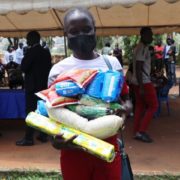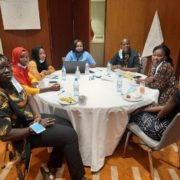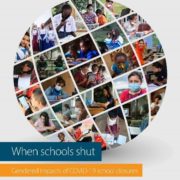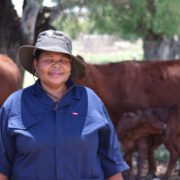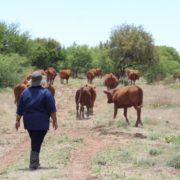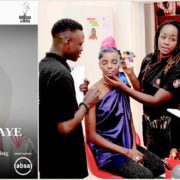Kenyan girls missing out on education – Forum for African Women Educationalists: FAWE
Blog by FAWE Kenya
Crises can exacerbate the hurdles girls face in education, including sexual and gender-based violence, teenage pregnancy and child marriage. In Kenya, girls from Turkana host communities and urban refugee girls in Eastleigh informal settlement, Nairobi, are disadvantaged at all stages of education and struggle to learn given the high levels of vulnerabilities. In these fragile and crises-affected contexts, more than any other, girls’ education is a lifeline. Unfortunately, many girls remain out of school.
At the advent of Covid 19, the Government of Kenya announced the closure of schools and educational institutions as a precautionary measure to mitigate the risk of human-to-human transmission of Covid 19, to protect children from being affected and to minimize the spread of the virus in the community. So much has transpired since Covid 19 hit the country. During the school lockdown, girls lacked food and sanitary towels, which then, were provided by schools and NGOs. They also did not learn. Most were unable to access learning materials while at home and other learning channels were unavailable. For instance, most parents do not have radios hence girls did not benefit from the school radio programs by the Kenya Institute of Curriculum Development (KICD). In addition, due to the poverty and lack of internet connectivity, most girls had no computers or smartphones to enable them attend classes.
From the case study conducted by FAWE Kenya, Turkana County does very poorly in keeping girls in school once they are enrolled. There is a dramatic fall in the number of girls as they progress in subsequent classes. In 2020, for instance, 700 girls sat for KCPE against 997 boys, implying more boys completed primary school compared to girls in the host community. The rural based host community of Turkana have negative attitude towards girls’ education. They believe that girls’ education is optional and not compulsory. They therefore, prefer to take boys to school and have girls stay at home providing labor such as looking at goats and caring for household chores. Significantly, they see girls as a source of wealth hence no value in educating them. Their focus is to get girls married off for them to get family wealth. They see girls as “Equity Bank or any other bank” where they can save income. Male parents believe that girls belong to them and it is their prerogative right to decide when and which girl is to be beaded and married off. Consequently, they insist on marrying off girls at a tender age in exchange of cows, and camels, which should belong to them. Moreover, they perceive schools as a place where girls are introduced to “foreign cultures” such as sex, abortion, use of drugs, and graduate with pregnancy which do not occur if they stay at home. Other factors affecting learner achievements for girls in the Turkana host community include inadequate teachers, language barrier, inadequate female teachers, inadequate learning facilities, poor attitude towards education, girls’ indiscipline and lack of role models.
FAWE Kenya works to ensure that all girls access education and this promotes stability among vulnerable girls. Educated girls are equipped with tools for resolving disputes peacefully, and are more productive. Quality education has been shown to promote tolerance and help resist recruitment to violent extremism.
When families are forced to flee for safety, young girls miss out on education. For instance, many urban refugee girls and families have fled Somalia due to forced recruitment and abduction of children to the conflict and found themselves in Eastleigh, Nairobi. Most of the urban refugee girls in Eastleigh fled their countries, at a tender age. Majority 30.8%, were forced to flee to Kenya because of fear of abduction by militias, while 26.9% were forced out of their countries by war and internal violence. Most of these girls were looking for peace since their home countries are war- torn areas. Some of the girls were looking for education. Some were looking for employment, and greener pastures, especially those from Congo. Besides war and persecution, some urban refugee girls feared early marriage and female genital mutilation, a common practice in their home countries.
In Eastleigh Nairobi, school-going girls who have been forcibly displaced have been barred from education because they lack official documentation. There are only six public schools, and a couple of private schools that enroll urban refugee girls and are characterized by overcrowded classrooms and teachers do not have the requisite skills to deal with refugees. Lack of legal status, especially necessary documentation such as ID or birth certificate or proof of prior learning, required for one to register in a school is a major barrier for urban refugee girls to access school. The presence of refugee girls in Eastleigh have resulted in influx of private schools because of inability of the public schools to absorb and enroll all of them.
The urban refugee girls lack transportation options for accessing schools safely with 59% mentioning distance to school as a major barrier to schooling. Typically, because of time spent in finding where to settle, most of refugee girls are overaged for their grade/class for both primary and secondary schools. Because of colour and height, they are laughed at and ridiculed by other learners in schools. For example, there are some South Sudanese refugee girls who do not go to school due to stigmatization out of their physical appearances, especially color and height, and end their schooling to enter into the workforce, mostly as househelps.
In the effort to address barriers to girls’ enrolment, participation, and completion in Turkana host communities and Eastleigh, Nairobi, FAWE Kenya is critically accelerating action to advance gender parity, with a greater focus on gender equality in and through education to ensure vulnerable girls from crises and conflict-affected areas receive the full benefits of education. We are encouraging parental engagement and girls’ participation in informing the planning of education in emergency settings to ensure responses are effectively addressing their needs in a way that benefits them. Their voices should be systematically heard.
We have capacity-built policymakers and women rights organizations, education advocates, duty bearers and every stakeholder involved in EiE as part of influencing decision making and budgetary allocations at the county and national levels to ensure that provision of quality and safe education for our girls is a top priority. Through the Nairobi and Turkana advocacy working groups, we are addressing a wide range of barriers to girls’ education using data-driven and gender responsive strategies, tools and approaches to put gender equality at the heart of EiE.
We have conducted extensive research to document evidence-based strategies that will change the narrative for girls growing up in crisis-affected contexts, strengthening their resilience and potential to rebuild their lives and shape their communities. Our research applied a data-driven gender analysis whereby we used qualitative and quantitative data disaggregated by sex and other factors to identify and understand existing gender disparities as well as gender-biased norms and practices related to access and learning for girls living in Turkana host community and urban refugee girls in Eastleigh Nairobi. We have documented disaggregated and nuanced data regarding what is happening and why it is happening. This critical evidence will be integrated into the Kenyan education sector assessments and responses and will be used to inform programme design, implementation, partnerships, monitoring and reporting to accelerate results in gender equality for girls’ education in emergencies.
Additionally, in our advocacy efforts, we are mobilizing multi-sector responses in addressing the full spectrum of barriers that keep girls out of school, while ensuring community involvement and establishment of accountability mechanisms. For instance, in Turkana County, through ‘Wasichana wetu wafaulu’’ program, sanitary towels are provided at the ministry of education. However, distribution has remained a major challenge. FAWE Kenya, through the working group, committed to hold the county education officers accountable to follow-up on the distribution. This will ensure that the poor and needy girls from the host community access the sanitary towels and are able to attend school more frequently.
There is need for improved coordination between the Government, CSOs and other stakeholders to promote girls’ education in emergency settings and encourage communities to champion girls’ education.


